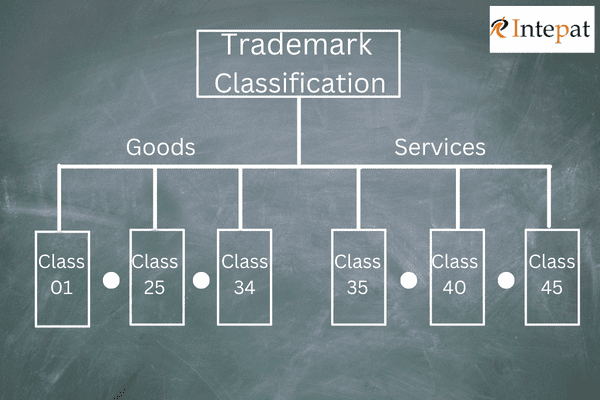Trademark Classification
When you file for a trademark in India, an indispensable requirement is finding out the trademark classification of your goods or services under which you must file your brand. Even when conducting a trademark search, you need to know the “trademark classification” and “trademark classes.”
The system of trademark classification eases the process of registration of a trademark. It groups different categories of goods and services under one trademark class. Thus, it gives the trademark registration process a definite structure. Accordingly, the applicant can choose the broad class under which their goods or service description falls. The trademark classification of goods and services also enables people to conduct a trademark search. Imagine having to look through thousands or even lakhs of registered trademarks to find out if there is a mark that is similar to yours. That would be a nearly impossible task. The trademark classification helps avoid this by allowing you to search for a prior trademark in the class where you want to register your trademark in India.
Trademark Act for Classification:
It can be said that trademarks can be considered the special and unique signs used to identify goods or services from a particular company. Trademarks have been classified as a type of intellectual property and therefore are protected from infringement by a third party from detonating the product’s quality and brand value. In India, the trademarks and the rights of trademark owners are protected by the Trademark Act 1999.
The trademarks have been classified into different classes according to Section 7 of the Trademark Act, which states as
“7. Classification of goods and services
(1) The Registrar shall classify goods and services, as far as possible, by the International Classification of goods and services to register trademarks.
(2) Any question arising as to the class within which any goods or services falls shall be determined by the Registrar whose decision shall be final.”
Indian Trademark Classes List
Under Section 8 of the Trademarks Act, 1999, the Registrar published an alphabetical index of classification of goods and services on 29.11.2013.
The Fourth Schedule to the Trademark Rules, 2002, lays down the different trademark classes. The trademark classes are categorized following the various categories of goods and services, and the appropriate class needs to be identified before filing a trademark application. On the whole, there are 45 trademark classes. Of the 45, class 1 to 34 is for goods trademark classification, and class 35 to 45 is related to service trademark classification, as provided below.
Goods (Products)
| Class 01 | Chemicals for use in industry, science, and photography, as well as in agriculture, horticulture, and forestry; Unprocessed artificial resins, and unprocessed plastics; Fire extinguishing and fire prevention compositions; Tempering and soldering preparations; Substances for tanning animal skins and hides; Adhesives for use in industry; Putties and other paste fillers; Compost, manures, fertilizers; Biological preparations for use in industry and science |
| Class 02 | Paints, varnishes, lacquers; Preservatives against rust and against deterioration of wood; Colorants, dyes; Inks for printing, marking and engraving; Raw natural resins; Metals in foil and powder form for use in painting, decorating, printing and art |
| Class 03 | Non-medicated cosmetics and toiletry preparations; Non-medicated dentifrices; Perfumery, essential oils; Bleaching preparations and other substances for laundry use; Cleaning, polishing, scouring, and abrasive preparations |
| Class 04 | Industrial oils and greases, wax; Lubricants; Dust absorbing, wetting, and binding compositions; Fuels and illuminants; Candles and wicks for lighting |
| Class 05 | Pharmaceuticals, medical and veterinary preparations; Sanitary preparations for medical purposes; Dietetic food and substances adapted for medical or veterinary use, food for babies; Dietary supplements for human beings and animals; Plasters, materials for dressings; Material for stopping teeth, dental wax; Disinfectants; Preparations for destroying vermin; Fungicides, herbicides |
| Class 06 | Common metals and their alloys, ores; Metal materials for building and construction; Transportable buildings of metal; Non-electric cables and wires of common metal; Small items of metal hardware; Metal containers for storage or transport; Safes |
| Class 07 | Machines, machine tools, power-operated tools; Motors and engines, except for land vehicles; Machine coupling and transmission components, except for land vehicles; Agricultural implements, other than hand-operated hand tools; Incubators for eggs; Automatic vending machines |
| Class 08 | Hand tools and implements, hand-operated; Cutlery; Side arms, except firearms; Razors |
| Class 09 | Scientific, research, navigation, surveying, photographic, cinematographic, audiovisual, optical, weighing, measuring, signalling, detecting, testing, inspecting, life-saving and teaching apparatus and instruments; Apparatus and instruments for conducting, switching, transforming, accumulating, regulating or controlling the distribution or use of electricity; Apparatus and instruments for recording, transmitting, reproducing or processing sound, images or data; Recorded and downloadable media, computer software, blank digital or analogue recording and storage media; Mechanisms for coin-operated apparatus; Cash registers, calculating devices; Computers and computer peripheral devices; Diving suits, divers’ masks, ear plugs for divers, nose clips for divers and swimmers, gloves for divers, breathing apparatus for underwater swimming; Fire-extinguishing apparatus |
| Class 10 | Surgical, medical, dental, and veterinary apparatus and instruments; Artificial limbs, eyes, and teeth; Orthopaedic articles; Suture materials; Therapeutic and assistive devices adapted for persons with disabilities; Massage apparatus; Apparatus, devices, and articles for nursing infants; Sexual activity apparatus, devices, and articles |
| Class 11 | Apparatus and installations for lighting, heating, cooling, steam generating, cooking, drying, ventilating, water supply and sanitary purposes |
| Class 12 | Vehicles; Apparatus for locomotion by land, air, or water |
| Class 13 | Firearms; Ammunition and projectiles; Explosives; Fireworks |
| Class 14 | Precious metals and their alloys; Jewellery, precious and semi-precious stones; Horological and chronometric instruments |
| Class 15 | Musical instruments; Music stands and stands for musical instruments; Conductors’ batons |
| Class 16 | Paper and cardboard; Printed matter; Bookbinding material; Photographs; Stationery and office requisites, except furniture; Adhesives for stationery or household purposes; Drawing materials and materials for artists; Paintbrushes; Instructional and teaching materials; Plastic sheets, films, and bags for wrapping and packaging; Printers’ type, printing blocks |
| Class 17 | Unprocessed and semi-processed rubber, gutta-percha, gum, asbestos, mica, and substitutes for all these materials; Plastics and resins in extruded form for use in manufacture; Packing, stopping, and insulating materials; Flexible pipes, tubes, and hoses, not of metal |
| Class 18 | Leather and imitations of leather; Animal skins and hides; Luggage and carrying bags; Umbrellas and parasols; Walking sticks; Whips, harness, and saddlery; Collars, leashes, and clothing for animals |
| Class 19 | Materials, not of metal, for building and construction; Rigid pipes, not of metal, for building; Asphalt, pitch, tar, and bitumen; Transportable buildings, not of metal; Monuments, not of metal. |
| Class 20 | Furniture, mirrors, picture frames; Containers, not of metal, for storage or transport; Unworked or semi-worked bone, horn, whalebone or mother-of-pearl; Shells; Meerschaum; Yellow amber |
| Class 21 | Household or kitchen utensils and containers; Cookware and tableware, except forks, knives, and spoons; Combs and sponges; Brushes, except paintbrushes; Brush-making materials; Articles for cleaning purposes; Unworked or semi-worked glass, except building glass; Glassware, porcelain, and earthenware |
| Class 22 | Ropes and string; Nets; Tents and tarpaulins; Awnings of textile or synthetic materials; Sails; Sacks for the transport and storage of materials in bulk; Padding, cushioning, and stuffing materials, except of paper, cardboard, rubber or plastics; Raw fibrous textile materials and substitutes therefor |
| Class 23 | Yarns and threads, for textile use |
| Class 24 | Textiles and substitutes for textiles; Household linen; Curtains of textile or plastic |
| Class 25 | Clothing, footwear, headwear |
| Class 26 | Lace, braid and embroidery, and haberdashery ribbons and bows; Buttons, hooks and eyes, pins and needles; Artificial flowers; Hair decorations; False hair |
| Class 27 | Carpets, rugs, mats and matting, linoleum and other materials for covering existing floors; Wall hangings, not of textile |
| Class 28 | Games, toys, and playthings; Video game apparatus; Gymnastic and sporting articles; Decorations for Christmas trees |
| Class 29 | Meat, fish, poultry, and game; Meat extracts; Preserved, frozen, dried, and cooked fruits and vegetables; Jellies, jams, compotes; Eggs; Milk, cheese, butter, yogurt, and other milk products; Oils and fats for food |
| Class 30 | Coffee, tea, cocoa and substitutes thereof; Rice, pasta, and noodles; Tapioca and sago; Flour and preparations made from cereals; Bread, pastries, and confectionery; Chocolate; Ice cream, sorbets, and other edible ices; Sugar, honey, treacle; Yeast, baking-powder; Salt, seasonings, spices, preserved herbs; Vinegar, sauces and other condiments; Ice [frozen water] |
| Class 31 | Raw and unprocessed agricultural, aquacultural, horticultural, and forestry products; Raw and unprocessed grains and seeds; Fresh fruits and vegetables, fresh herbs; Natural plants and flowers; Bulbs, seedlings, and seeds for planting; Live animals; Foodstuffs and beverages for animals; Malt |
| Class 32 | Beers; Non-alcoholic beverages; Mineral and aerated waters; Fruit beverages and fruit juices; Syrups and other preparations for making non-alcoholic beverages |
| Class 33 | Alcoholic beverages, except beers; Alcoholic preparations for making beverages |
Services
| Class 34 | Tobacco and tobacco substitutes; Cigarettes and cigars; Electronic cigarettes and oral vaporizers for smokers; Smokers’ articles; Matches |
| Class 35 | Advertising; Business management, organization, and administration; Office functions |
| Class 36 | Financial, monetary, and banking services; Insurance services; Real estate affairs |
| Class 37 | Construction services; Installation and repair services; Mining extraction, oil and gas drilling |
| Class 38 | Telecommunications services |
| Class 39 | Transport; Packaging and storage of goods; Travel arrangement |
| Class 40 | Treatment of materials; Recycling of waste and trash; Air purification and treatment of water; Printing services; Food and drink preservation |
| Class 41 | Education; Providing of training; Entertainment; Sporting and cultural activities |
| Class 42 | Scientific and technological services and research and design relating thereto; Industrial analysis, industrial research and industrial design services; Quality control and authentication services; Design and development of computer hardware and software |
| Class 43 | Services for providing food and drink; Temporary accommodation |
| Class 44 | Medical services; Veterinary services; Hygienic and beauty care for human beings or animals; Agriculture, aquaculture, horticulture and forestry services |
| Class 45 | Legal services; Security services for the physical protection of tangible property and individuals; Personal and social services rendered by others to meet the needs of individuals |
Nice Classifications
The classification of the goods and services has been according to the International Classification of Goods and Services for registration of Trademarks following the provisions that curtail and thereby are done by the Registrar and had been a better framework for the goods and service review.
The reason for this system is to give a definitive structure to the intellectual property rights granted by the registration of a trademark. This is made possible by specifying the goods or services covered by the mark using a universally standard classification system. (NICE Classification).
The Indian trademark classification of goods and services is based on the 10th edition of the NICE classification. The NICE classification was established by the NICE Agreement in 1957. From 22nd December 2015, the Indian trademark office has started to provide Online Search Facility for the Classification of Goods and Services to register trademarks. Further, you can access the alphabetical index of the classification of goods and services provided in the NICE classification. This alphabetical index of goods or services appearing in the class headings is a general indication relating to the fields to which, in principle, the goods or services belong.
How to search the trademark classes?
To search for the class under which your product or service falls,
i) you can browse and search Nice classification, or else
ii) choose CGPTM(IN) office databases in TMclass, and enter the product or service description in the box for search terms.
Case study – to understand the importance of classes
In the landmark case of Mittal Electronics vs. Sujata Home Appliances (P) Ltd. & Ors, it was held that.
“It was possible for a subsequent entity to obtain a registration in respect of specific goods within a particular class even if there exists a registration on an identical or similar trademark which covers the entire class if it is established that the prior registered proprietor had no intention of using the mark in respect of the specific goods sought to be registered by the subsequent applicant. “
This case stressed that the person holding a trademark cannot enjoy a monopoly over the entire class of goods, and the trademarks can be used for different classes of goods. The court had an injunction in favor of the plaintiff, restraining the defendant from using the impugned trademark except for water filters, water purifiers, and RO Systems, as they had been in a different category or class of goods.
[cherry_button text=”Need help? Connect with experts” url=”https://www.intepat.com/contact-us/” style=”success” centered=”yes” fluid_position=”right” icon_position=”top” bg_color=”#f79351″ min_width=”33″ target=”_blank”]




